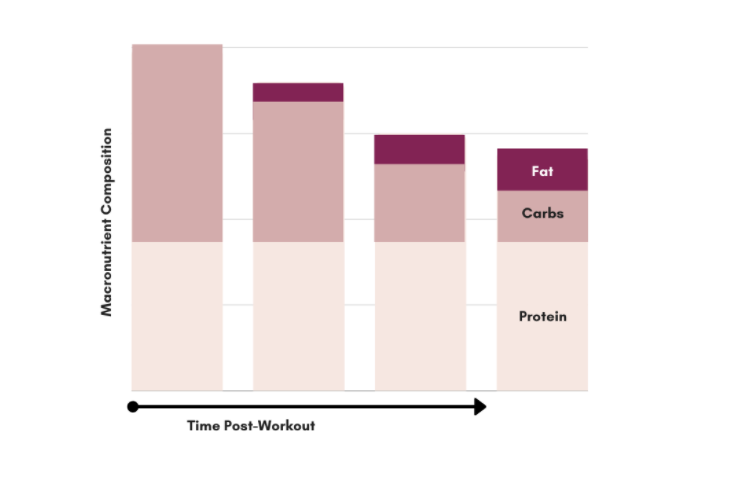
This is a guest post by Caroline Ofenstein. Check out the bottom of the post for more information about Caroline.
“Can I workout fasted?”
“Do I need to drink a protein shake immediately post-workout?”
“What should I eat before heading to the gym?”
These common questions in the nutrition space all center around the same topic - nutrient timing.
Nutrient timing may sound like a complex topic only for experts, but anyone who is serious about their training should know the basics of nutrient timing - or more simply - what you eat and when you eat it!
If you want to perform at your best and recover well, dialing in your timing of macronutrient consumption and supplementation can play a major role.
The three main categories of nutrient timing we’re going to cover in this blog are:
→ Pre-Workout
→ Intra-Workout
→ Post-Workout
Real food and supplements should be consumed in one, two, or all three of these windows, depending on your training and personal goals.
Let’s dive into the three main nutrient timing windows and how to best consume food & supplements around your training.
Pre-Workout Nutrition
Defined As:
Pre-workout nutrition includes anything eaten in the timeframe of about two hours to 30 minutes before your training session.
Purpose:
The primary purpose of your pre-workout nutrition is to fuel your training. Consuming carbohydrates pre-workout to top off your glycogen stores will allow for high intensity output and will also support better muscle contractions, due to higher levels of glucose in the bloodstream. Amino acids are also recommended pre-workout to help increase total work capacity and decrease muscle recovery.
The leaner you are and/or harder you’re performing in your sport or training, the more crucial pre-workout nutrition becomes. When we have a lot of weight to lose, we have more readily available nutrients – which makes things like daily total intake much more of a priority. But as you go further and further into your fat loss journey, this becomes more crucial for great workouts.
Recommended Pre-Workout Supplements:
Core Fury
Core Pump
Core ABCD
Who Needs Pre-Workout Nutrition:
Anyone who wants that “pump” in their workout and/or anyone pushing high intensity performance (i.e. bodybuilders, HIIT cardio sessions, CrossFit, OTF, etc.)
Follow the below guidelines for how to structure your pre-workout meal:
→ One to two hours before your workout eat a meal with protein and carbs, little to no fat. Fats slow digestion and you don’t want to feel overly full when you have to pick up your weights. The further out from your workout you are, the more acceptable fats are in this meal. *Note: If you’re someone who experiences hyperglycemia easily, you’d want 5-10g of fats in this pre workout meal to avoid that from occurring during training.
→ Be conscious of meal size. Having a meal that is too large pre-workout will not be digested quickly and can lead to discomfort or nausea. On the other hand, eating a meal that is too small will leave you insufficiently fueled for your workout.
→ Choose quick, easily digestible carbs in this meal like rice, cream of rice, or potatoes.
→ About 15-30 minutes before your workout, mix up your pre-workout drink (I like to sip mine on my drive to the gym) then crush your workout!
Intra-Workout Nutrition
Defined As:
Consuming nutrients during your workout – typically via liquid carbs (like cyclic dextrin) or amino acids.
Purpose:
Stored glycogen is your body’s fuel for most workouts (those lasting less than an hour), but adding in intra-workout supplementation can be useful to support performance for longer, more intense workouts or endurance activities.
Pre-Workout Supplements:
Core Intra
Core ABCD
Who Needs Intra-Workout Nutrition:
People who are lean and want to gain muscle mass, athletes exercising for longer than 60 minutes, or those exercising with high volume and intensity (i.e. high volume bodybuilders).
Intra-workout carbs and amino acids can help provide additional energy and urge your body to continue using carbohydrates as fuel instead of storing and conserving energy and becoming fatigued.
If your main goal is to build muscle, consuming a supplement with cyclic dextrin will help blunt the cortisol response during training and prevent any catabolic processes (2). By decreasing the muscle damage, you will be able to recover faster and workout harder tomorrow.
To further enhance your muscle growth during training, sip on Core Intra during your workout. This product contains essential amino acids and, being combined with cyclic dextrin, can improve the absorption of those amino acids to your skeletal muscle (3). This can trigger muscle protein synthesis and promote lean gains.
Core Intra can help with:
- Delaying fatigue onset
- Increasing maximal voluntary contractile force
- Increase maximal oxygen uptake capacity
- Reducing delayed onset muscle soreness
- Increasing one rep maximums in bench press and squat
- Increasing localized blood flow
Not all workouts require the same amount of glycogen as bodybuilding or high intensity sessions, and therefore each athlete will need to find the intra-workout protocol that works best for them.
But no matter your requirements for intra-workout or pre-workout nutrition, always have a post-workout plan to aid recovery and blunt the cortisol response after your training session, as discussed below.
Post-Workout Nutrition
Defined As:
Nutrients consumed after you’ve finished training.
Purpose:
The goal of your post-workout nutrition is to calm the stress response from training, kick start the recovery process, and avoid a catabolic state. Your body is very insulin sensitive post-workout and is primed to use carbohydrates to replenish glycogen, not storing any as body fat, which is another reason this is a powerful time to consume – not necessarily because you’ll gain more muscle from rushing to this meal, but because it’s less likely your body will partition those calories as fat instead of muscle. It’s not a make or break benefit, but why not utilize this sensitive time?!
Post-Workout Supplements:
Core ISO
Core Post
Core Pro
Who Needs Post-Workout Nutrition:
Pretty much everyone!
In previous years the popular opinion was that you had to consume protein and carbs immediately post workout or else sacrifice all muscle growth. With better research methods today, we know that’s not exactly true.
You do need to consume protein and carbohydrates after your training session to prevent a catabolic state, but the post-workout window is larger than previously assumed. Recent studies show muscles to be most sensitive to resynthesis within three hours after training. Therefore, we recommend consuming quick digesting carbs and protein upon completion of training, no later than three hours post-training, to reap the anabolic benefits.
The more stressed out your lifestyle is and/or the more intense your training is, the faster that drink should be consumed – but not because it’s more anabolic for growth, but because it’s more likely to reduce the stress response by spiking insulin faster which inherently blunts the cortisol response.
For the average person, one serving of each (25g protein + 25g carbs) at minimum should be consumed post-workout, two servings for larger athletes. We recommend avoiding fats in your post-workout meal to prevent delayed digestion.
If you are done training and have time to eat a solid meal after your workout, consume easily digestible protein and carbohydrates such as chicken, egg whites, rice, and potatoes. Have some starch with this meal such as oatmeal, potatoes, or grains.
A good strategy for most serious lifters is to supplement the post workout window with a quick digesting carb + Whey, at a 1:1 or 2:1 ratio, immediately post workout, if intra-workout carbs were not consumed. After this, you can take their time getting to their full meal, which at this point can be more balanced across all the macronutrients (protein | carb | fat).
A note on working out fasted…
Working out on an empty stomach is not ideal if your goal is to hit a new PR because it will be harder to reach that higher intensity without readily available blood glucose.
I totally understand not wanting to scarf down a huge bowl of oatmeal at 5AM before your training session, but taking a pre-workout supplement can increase focus and help you push performance on low glycogen stores first thing in the morning.
Take the time for your nutrition in the morning and set the stage for feeling strong during your workout and for the rest of the day!
And keep in mind that total nutrient consumption will be very individual and depend on your current lifestyle, exercise routine, and future goals. For more specific details on how to fuel your best performance, talk with a coach! Check out my website and apply for one on one nutrition coaching through this link!
Sources:
- “Effect of a sports drink based on highly-branched cyclic dextrin on cytokine responses to exhaustive endurance exercise.” https://www.ncbi.nlm.nih.gov/pubmed/25270782
- Mountain Dog Training and Nutrition by John Meadows CSCS, IFFB Pro “Independent and combined effects of liquid carbohydrate/essential amino acid ingestion on hormonal and muscular adaptations following resistance training in untrained men.” https://www.ncbi.nlm.nih.gov/pubmed/16456674









